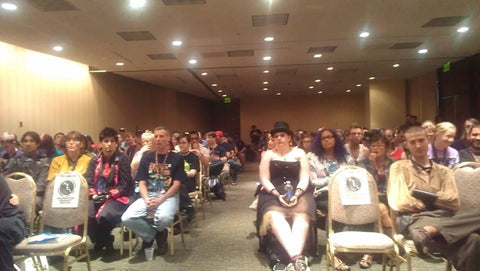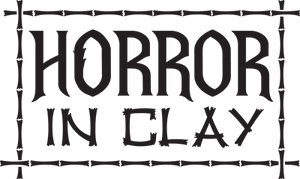Corner-booth Blog #5 - A Con Job: Tips for convention panel speakers
Posted by Jonathan Chaffin on
A Con Job: Tips for convention panel speakers

You've just been made an expert in something and now people are inviting you to talk to other people at conventions. What do you do? Grab a mug of your favorite beverage and read on.
Disclaimer - these are just some notes from my own perspective and experience, by no means exhaustive or complete. Hopefully useful and cogent, but I'm not promising anything. This is the exact opposite of an expert opinion.
Really basic 101 type stuff
When you go to Sci-Fi, Fantasy, Horror, Pop Culture conventions etc there are usually panels you can sit in to learn more about your favorite topics. I've had the good fortune to be on a few panels* (usually in a crowd of other folks, usually related to Lovecraft/Cthulhu, fundraising, marketing, or prop-making).
Panels are fun, but they can be stressful for panelists, and the stress can come from some strange directions. I wanted to run down some of the more common thoughts and observations I've had, on the off chance they are useful to someone about to be on their first convention panel.
- So you're going to be on a panel…GREAT! They are fun! REMEMBER THAT! In any setting you can enjoy the atmosphere or you can BE part of the atmosphere. If you've been asked to be on a panel (or Q&A session, or to speak) it means, first and foremost, the panel organizer (track director or whoever) trusts you to contribute positively to the panel/track/convention. Heady times, my friend!
- Either you are an authority on a subject, were directly involved, have a unique perspective, or are really entertaining in front of a crowd. Or all of the above. Let that be your armor against self-consciousness and doubt; the organizer trusts you. Try and relax and remember that you are there in front of the crowd to be you; to bring your knowledge and experience and personality to the panel.
- Don't let the organizer down. Here's a handy dandy sub-list that will help you out.
WAY BEFORE THE SHOW
- When you are asked to be on the panel, nail down some specifics if they exist. What tone does the organizer want the panel to have (if any).
- Who will you be on the panel with? (You can and probably should look up your fellow panelists. This may induce nervousness or an inferiority complex, it may not. Try not to worry about it if it does…see #2 above). ALSO; remember, you have to speak too! I confess I have gotten too wrapped up and interested in what a co-panelist was saying and missed making a point I intended to add.
- Who is the audience? Speak to their interests and with language at their level.
- What does the organizer need/expect from you? Do you need to prepare a bio? How long? Can you/should you promote the panel on your social media sites (hint: almost always yes)?
- Do you intend to have any advertising collateral to leave in the room (perhaps by a water cooler or table outside?) Is that cool?
- Is it cool to have any book/movie/art example etc. that you are currently promoting discretely on the table with you? (Want to feel dumb? Leave yours at home and have everyone else lay their stuff on the table. I will always carry a Horror In Clay Cthulhu tiki mug with me from now on, just in case).
- Google the subject of your panel, unless you are an absolute expert on it, and take a few notes, or print out some notes. It does make one seem a bit more authoritative and helps refresh knowledge.
BEFORE THE PANEL
- Dress in a manner that feels most comfortable to you and helps bring out the you-ness to the surface. You will present more comfortably if you are comfortable. I can't make up my mind if showing up in a "Cthulhu Waits Drinking" shirt makes me the guy in the band wearing the band's shirt or not…so I err on the side of marketing and do it anyway. Plus it's comfy.
- Every day at the event, check in with the schedule/organizer and make sure the panel is still at the same time and location you expect it to be.
- Have a friend in the audience with a decent camera who can take a few photos. (You might ask if video is ok, and if so have someone video the panel for you**).
- Eat something. I don't mean a turkey dinner, nachos with all the trimmings, and 16 glasses of beer, but don't be preoccupied with being hungry (or with being full).
- Bring a pad of paper and a pen. Things will occur to you during the panel - it is helpful to be able to jot them down. Also to take notes, or questions you want to answer more fully online later.
RIGHT BEFORE THE PANEL
- Show up early.
- Locate the nearest bathroom and use it once or twice before.
- Don't be nervous.
- Turn off your cell!
- Try and meet the moderator before hand.
- Make sure you have water.
- Get your fooling with the mic finished early. A non-adjustable table mic stand puts the mic at about a foot off the table. I'm a tall man with a large belly, so leaning forward to speak into the mic on table makes me feel self conscious, breaks my eye contact with the audience, and compresses my larynx…you may not need to do anything special to talk into a mic, but if you do, think about it in advance. Will you hold it? Be aware your arm may get tired. You may want to raise the mic stand/put it up on a stack of books (if so, bring a plain solid block or something).
- I personally recommend trying to at least exchange words with the other panelists beforehand, but that may or may not happen.
DURING THE PANEL
- HAVE FUN!
- I've noticed there is a fair amount of "who's turn is it to speak" glancing around when in the front of the room. Sometimes there is a natural order to questions (everyone takes a turn answering) and sometimes there is a moderator handing cues. Try and look for the cues that it is "your turn" to speak, but be aware it is ok to follow up/interject where appropriate - just ALWAYS be respectful of your fellow panelists.
- Some people are more comfortable and experienced than others - if that's you, try and engage your fellow panelists a bit - in my experience the BEST panels get a little crosstalk going.
- First and foremost a panel should be informative for the audience and interactive with them; that can be a little easier to achieve if the panelists have already set a conversational tone. NEVER devolve to having a conversation at the front of the room that the audience isn't involved in; you'll lose them really fast that way.
- Don't shout into the mic. Don't swallow it. Certainly don't leap on the table and swing it around by the cord (unless it is a panel on 80's glam metal…then swing away).
- Try not to obsess over how you did. Like any stage performance, you probably are far more critical of yourself than you should be. Also, recordings will make you look and sound horrible to yourself. If you have one take note of how more experienced panel members fielded questions and segued between the question asked and the one they wanted to answer (pretty common I've noticed). If you don't have an answer you can just say that, or you can do the best you can and skew discussion in a direction you know.
- Pro Tip - if you have a bonafide authority on the panel and can't recall specifics when asked a question, you can sometimes Tai Chi the situation. Once upon a time (last week) I was on a panel entitled "Cthulhu 101" with Kenneth Hite…who WROTE "Cthulhu 101". When a fellow panelist was asked something about depictions of Cthulhu he started his answer with, "Ken can probably fill in some more detail, but from what I recall, Lovecraft actually DREW Cthulhu in a letter". He then proceeded to talk about his inspirations and interpretations. That was a pretty good answer, and created more of a dialogue, because when he finished talking Ken filled in some more detail.
AFTER THE SHOW
- Be available if possible. You want to interact with any audience members.
- who want to interact with you, if you have the time. Some people are more available than others. At minimum thank the organizer on the way out, and be aware people might take it ill if you immediately bolt.
- About a week after the panel follow up with the organizer and say something like "Hi! Had a great time on the panel.Wanted to followup....was there any feedback (from you or the audience) relevant to the panel in general or my participation in particular that could help me become a better presenter/panel guest?"

Share this post
- 1 comment
- Tags: 2013 con appearances, appearances, conventions, cornerbooth, Cthulhu 101, DragonCon, how to, panel

I’ve been an active panelist for a few years now, a public speaker for longer than I wish to remember and a performer of one kind or another since I could stand up. Here’s few more things that can help:
1. Are you going to be miked? Microphones are a big help, especially to the new panel participant. You don’t have to fellate the mike to be heard, in fact it will distort your voice. Most moder microphones have a ‘shotgun’ effect and will pick up your voice nicely if placed in front of you and spoken into in your normal voice.
2. If you are NOT miked (hardly any cons do this to their panelists any more, but it could happen.) SPEAK UP! Your opinions are as important as anyone else’s sitting there. Speak clearly and don’t rush. Rushing through what you have to say makes it hard on the listener and decreases your effectiveness. Take your time. And while we’re on the subject:
3. Look up the terms “vocal fry” and “upspeak”. They are pure vocal DEATH! They are bad, lazy speech habits that will rob you of ALL your credibility, expose ALL your insecurities and probably make your audience HATE you. The good news is that they’re fairly easy habits to break once you know what they are. The bad news is that once you recognize then you will hear them time and again all around and you will grow to loathe the sound. Never mind, let other people be ignorant—you will sound all the better by contrast.
4. You are there because someone thinks you are knowledgeable about your subject. Use your smarts, smile at your audience (who are waiting with bated breath for every golden syllable you will drop on them) and enjoy yourself. TIP FOR THE NERVOUS NEWBIE: Keep a glass of water nearby on the table. Take a sip while you ponder what you’re going to say. You’ll be hydrated, your voice will be ringing clearly and you will look wonderfully wise and thoughtful.
5. Finally, this is supposed to be fun. Play with it. Smile, laugh, tell a really terribly joke if you can think of a relevant one. Unless you’re a natural comic a groaner is as good as a giggler to engage your audience. Enjoy yourself.